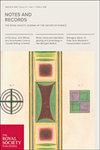《孟德尔的衣橱:遗传学、优生学和爱德华七世时代英国的性别例外》
IF 0.6
3区 哲学
Q3 HISTORY & PHILOSOPHY OF SCIENCE
Notes and Records-The Royal Society Journal of the History of Science
Pub Date : 2023-10-25
DOI:10.1098/rsnr.2023.0036
引用次数: 0
摘要
这篇文章将形成性的孟德尔和染色体戒律和修辞作为“生殖”生理学和爱德华七世时期英国更广泛的性学领域的组成部分。随着“内分泌”(激素)的发现,性染色体的发现,与20世纪初孟德尔遗传定律的重新发现几乎同时出现,改变了人们对性别决定和性发育问题的看法。方法是多种多样的,包括威廉·贝森,伦纳德·唐卡斯特,雷金纳德·克伦德尔·庞尼特,杰弗里·沃特金斯·史密斯等生物学家和他们的对话者协商了多种,经常是相互冲突的,社会政治的解释,使用和滥用,孟德尔的性方法是可以接受的。最具争议的是,人们认识到,任何可信的性生物学模型都必须考虑到各种各样的性现象,包括孤雌生殖、两性间性行为和性的转变,而且只有性的变化才能最好地提供对形成性特征的其他隐藏机制的见解。然而,这样的举动使新的性学遗传学和发展中的“生殖”生理学学科卷入了关于女权主义、同性恋和优生学的激烈辩论。这篇文章描绘了随之而来的紧张局势是如何在包括英国报纸在内的学术和流行平台上发挥作用的。本文章由计算机程序翻译,如有差异,请以英文原文为准。
Mendel's closet: genetics, eugenics and the exceptions of sex in Edwardian Britain
This article situates formative Mendelian and chromosomal precepts and rhetoric as an integral part of ‘reproductive’ physiology and the broader sexological terrain in Edwardian Britain. Alongside the discovery of ‘internal secretions’ (hormones), the discovery of the sex chromosomes, made around the same time as the rediscovery of Mendel's laws of heredity at the turn of the twentieth century, transformed the ways in which questions about sex determination and sex development were considered. Approaches were diverse as leading biologists including William Bateson, Leonard Doncaster, Reginald Crundall Punnett, Geoffrey Watkins Smith and their interlocutors negotiated the multiple, often conflicting, sociopolitical interpretations, uses and abuses that Mendelian approaches to sex were amenable to. Most contentiously, it was recognized that any credible model of sex biology had to account for all manner of sex phenomena, including parthenogenesis, intersexualities and transformations of sex, and that it was the variations of sex that best provided insights into the otherwise hidden mechanisms that shaped sex characteristics. Such a move, however, embroiled the new sexological genetics and the developing discipline of ‘reproductive’ physiology with vexed debates about feminism, homosexuality and eugenics. The article charts how the ensuing tensions played out across scholarly and popular platforms, including Britain's newspapers.
求助全文
通过发布文献求助,成功后即可免费获取论文全文。
去求助
来源期刊
CiteScore
1.50
自引率
0.00%
发文量
45
审稿时长
>12 weeks
期刊介绍:
Notes and Records is an international journal which publishes original research in the history of science, technology and medicine.
In addition to publishing peer-reviewed research articles in all areas of the history of science, technology and medicine, Notes and Records welcomes other forms of contribution including: research notes elucidating recent archival discoveries (in the collections of the Royal Society and elsewhere); news of research projects and online and other resources of interest to historians; essay reviews, on material relating primarily to the history of the Royal Society; and recollections or autobiographical accounts written by Fellows and others recording important moments in science from the recent past.

 求助内容:
求助内容: 应助结果提醒方式:
应助结果提醒方式:


